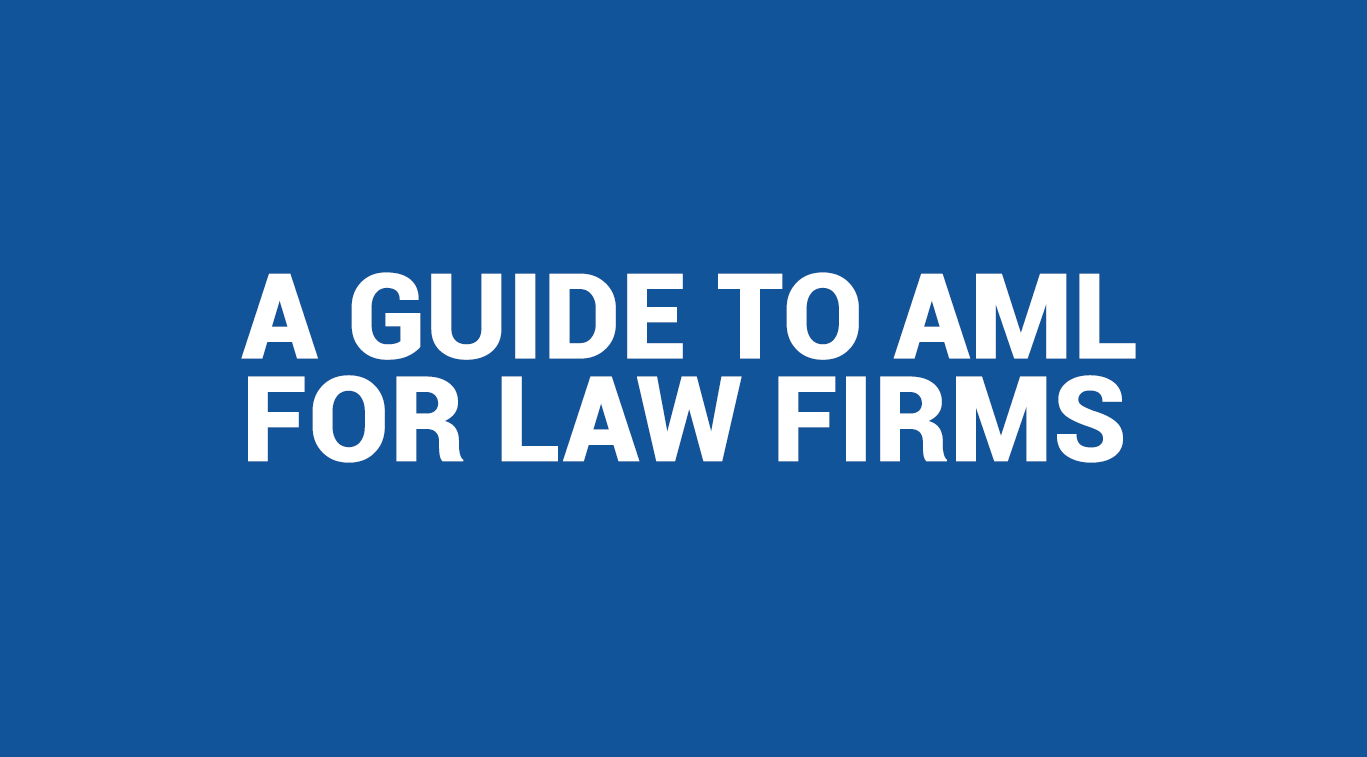A Guide to AML for Law Firms

Written by Ashley McDermott
Blogger

While law firms are not technically what many would class as financial institutions, they are still obligated to establish and maintain an effective anti-money laundering (AML) compliance program. As law firms provide professional services that may be used to facilitate money laundering and other financial crimes, they are seen as a high-risk sector regarding money laundering by the Solicitors Regulation Authority (SRA) [1].
AML compliance is an integral part of a law firm’s operations, and failure to comply can result in significant financial penalties. Possible implications for individuals or legal entities include up to 14 years imprisonment and an unlimited fine [2]. While it may seem daunting to establish and maintain an effective AML compliance program, there are resources available to help, such as legal software tools.
This guide provides an overview of what law firms need to know about AML compliance, including customer due diligence and record-keeping requirements.
AML Regulations in the UK
Anti-money laundering (AML) refers to regulations and guidelines intended to prevent criminals from trying to convert illegally-obtained funds into legitimate income. The National Crime Agency (NCA) states that money laundering costs the UK more than £100 billion annually due to criminal money’s negative implications on the UK economy[3]. AML compliance requires financial institutions and other organisations to take measures to detect and report suspicious activity[4].
The following AML regulations are in place within the UK:
Money Laundering, Terrorist Financing and Transfer of Funds (Information on the Payer) Regulations 2017 (MLRs)
The Money Laundering and Terrorist Financing (Amendment) Regulations 2019
The Money Laundering and Terrorist Financing (Amendment) Regulations 2022
On 10th January 2020, the Money Laundering Regulations 2019 amendment came into place, which implemented the EU Fifth Money Laundering Directive within the UK. These changes included a broadened range of businesses that fall under the original Money Laundering Regulations 2017, as well as changes to a firm’s customer due diligence obligations [5]. Not only does this mean that more businesses are now obliged to have AML compliance programs in place, but the level of risk assessment and customer due diligence required has also increased. These changes also mark the incorporation of the Financial Action Task Force (FATF) into the UK’s AML structure [6].
From 1st September 2022, the Money Laundering Regulations 2022 amendment has made further changes to AML regulations. These are to ensure the UK’s regime is further strengthened and continues to meet the standard that has been set internationally [7].
Why is AML Important for Law Firms?
Law firms are required to comply with AML regulations when they engage in certain transactions, such as forming new business entities. There are also specific AML rulings regarding setting up trusts, per Money Laundering and Terrorist Financing (Amendment) Regulations 2022. In addition, law firms must verify their clients’ identities before entering into a business relationship.
Alongside the above, law firms must have AML internal controls in place, such as:
Training for employees on their responsibilities regarding AML
Up-to-date AML policies
A compliance officer for larger businesses
As a law firm, you must ensure you have risk-based AML controls in place to mitigate the risk of being used for money laundering. You do not want your firm to be used as a vehicle for criminal activity. To elevate your firm’s anti-money laundering program, you must first understand your risks. Different firms will have various risk profiles depending on their size, location, type of clients, and the services they provide[8]. When we utilise legal tech software like Good Law Software, we can input all our client data and receive a comprehensive risk report in return.
Customer Due Diligence (CDD)
One of the most essential elements of an AML compliance program is customer due diligence (CDD). CDD is the process of verifying a client’s identity and assessing their business activities to determine whether they pose a high risk of Money Laundering or Terrorist Financing. Following correct ID checks is also vital for getting to Know Your Customer (KYC) standards. With legal technology solutions, we can streamline the required ID checks and lookups, helping to ensure that we are meeting our AML obligations while also saving time.
You must carry out CDD checks if you’re:
Have suspicions of money laundering
Creating a business relationship
Entering into an occasional transaction with a client that is above eur 15,000
If you have concerns about a customer’s ID
AML and ID checks are an important part of onboarding new clients and should not be seen as a hindrance to business. By incorporating legal cloud technology as provided by Good Law Software, which is integrated with compliance-centric Thirdfort, you can sleep with ease knowing that your firm is completing all the required CDD AML checks, ID checks and KYC efforts.
Proper Record Keeping
As a law firm, you should have efficient processes to ensure your company is appropriately keeping records. Not only does this help with managing your business, but it can elevate some of the stress when the SRA is due to audit your firm.
You must keep all records from any form of business relationship, including all ID checks and CDD, even once the connection has ceased. As stated by the FATF, you must keep this correspondence for at least 5 years following the end of the business relationship [9]. Record keeping can be time-consuming and put a strain on already busy law professionals; this is where legal cloud software and law firm practice management software comes in. Law software systems can help manage and automate all your correspondence, documentation, financial records and contact databases, helping you keep everything up to date and AML compliant.
Risk Management
An effective AML compliance program must also include risk management procedures to identify and mitigate risks associated with Money Laundering and Terrorist Financing. These procedures should consider such things as assessing which areas are more likely to be at high risk for fraud, such as tax fraud.[10]
If you suspect money laundering or terrorist financing at any time, you should immediately report this to your law firm’s nominated officer.
Conclusion
Developing an effective AML compliance program is essential for all law firms. By understanding the fundamental concepts of customer due diligence, record keeping, and risk management, firms can create robust programs that protect them from legal and reputational risks. In addition, by utilising law office solutions such as law firm safe technology provided by Good Law Software, which is integrated with Thirdfort for your convenience, firms can streamline their AML efforts and save time and money. Employing a Legal practice management software in your law firm can have a huge positive impact on your AML compliance. A good and complete legal practice management software will come, as in GLS’s case, with a built-in feature to conduct AML, KYC & ID checks.
References:
[1]How ‘risky’ is the Legal Sector? – BDO
[2]Anti Money Laundering Laws and Regulations Report 2022 United Kingdom (iclg.com)
[4]Your responsibilities under money laundering supervision – GOV.UK (www.gov.uk)
[5]Money Laundering Regulations 2019 (ifa.org.uk)
[6] Money Laundering Regulations | FCA
[7]MLRs_SI_2022_-_Consultation_Response_final.pdf (publishing.service.gov.uk)
[8] Frequently Asked Questions (FAQ) regarding Anti-Money Laundering (AML) | FINRA.org
[9] Recommendation 11: Record-keeping (cfatf-gafic.org)
[10]AML Guidance About Tax Evasion for Organizations – Sanction Scanner








